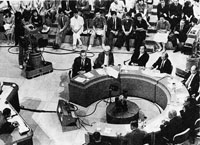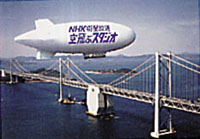
The late 1980's were a time of
global structural change. At NHK, the introduction of satellite broadcasting
made it possible to cover international news more broadly and in greater
depth. From the passing of the Emperor Showa to the fall of the Berlin
Wall, TV was there to share historic moments with viewers. |
The era changes on-screen |
|
TV and globalization NHK Special: 165 programs a year |
NHK
Special covered major events both inside and outside Japan, including
the fall of the Berlin Wall, the events in Tiananmen Square, and the Recruit
Scandal. Sometimes three to six consecutive evenings were devoted to such
topics. Can the Recruit Scandal Lead to Political
Reform? and Consumption Tax offer
just two examples. In one year alone, 165 NHK Special programs were broadcast.
Major series in 1990 included Socialism in
the 20th Century, which featured worldwide coverage of the seismic
political changes then taking place. From Showa to Heisei The Emperor Showa fell ill in the closing months of 1988 and died in January 1989. Japan entered the Heisei era. Television reported this transition from one era to the next for 111 consecutive days from the day the Emperor fell ill. Global perspectives and greater choice In 1989, NHK began full-scale satellite broadcasting on two channels. The service also provided programming for areas where terrestrial reception was poor. The BS-1 channel specializes in news and sports, while BS-2 focuses on culture and entertainment. In 13 years, NHK's satellite broadcasting has grown to become the world's most successful service provided by a single satellite, with 15 million viewing households. |
||
|
|


